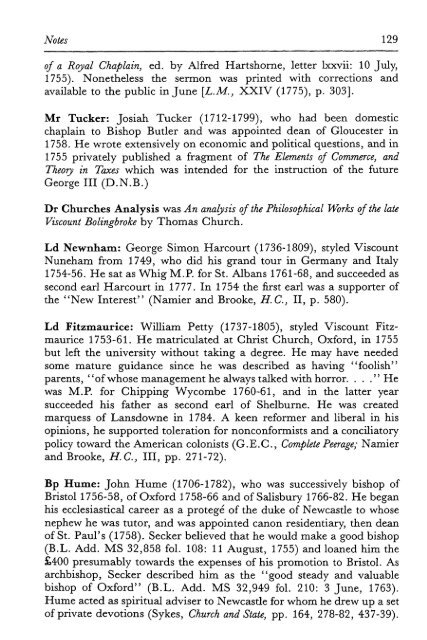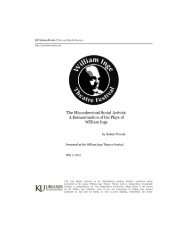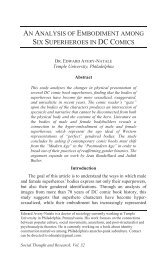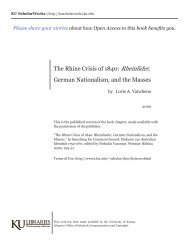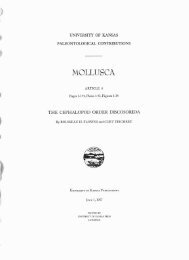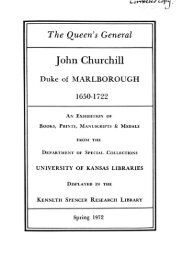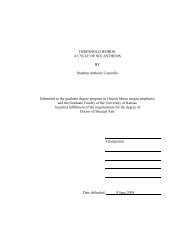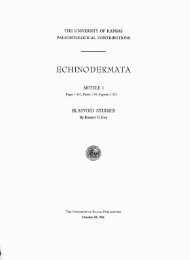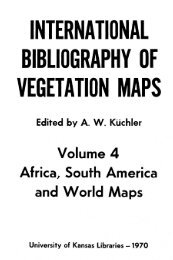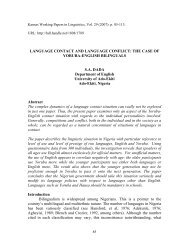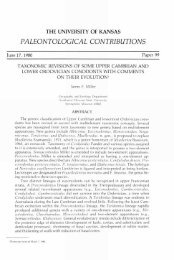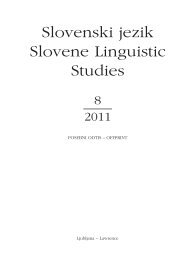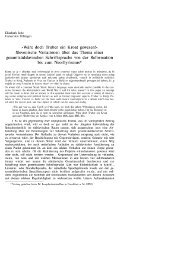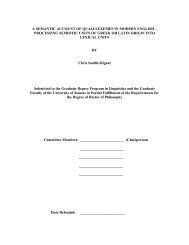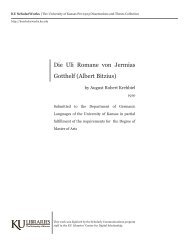Archbishop of Canterbury - KU ScholarWorks - The University of ...
Archbishop of Canterbury - KU ScholarWorks - The University of ...
Archbishop of Canterbury - KU ScholarWorks - The University of ...
You also want an ePaper? Increase the reach of your titles
YUMPU automatically turns print PDFs into web optimized ePapers that Google loves.
Notes 129<br />
<strong>of</strong> a Royal Chaplain, ed. by Alfred Hartshorne, letter lxxvii: 10 July<br />
1755). Nonetheless the sermon was printed with corrections and<br />
available to the public in June [L.M., XXIV (1775), p. 303].<br />
Mr Tucker: Josiah Tucker (1712-1799), who had been domestic<br />
chaplain to Bishop Butler and was appointed dean <strong>of</strong> Gloucester in<br />
1758. He wrote extensively on economic and political questions, and in<br />
1755 privately published a fragment <strong>of</strong> <strong>The</strong> Elements <strong>of</strong> Commerce, and<br />
<strong>The</strong>ory in Taxes which was intended for the instruction <strong>of</strong> the future<br />
George III (D.N.B.)<br />
Dr Churches Analysis was An analysis <strong>of</strong> the Philosophical Works <strong>of</strong> the late<br />
Viscount Bolingbroke by Thomas Church.<br />
Ld Newnham: George Simon Harcourt (1736-1809), styled Viscount<br />
Nuneham from 1749, who did his grand tour in Germany and Italy<br />
1754-56. He sat as Whig M.R for St. Albans 1761-68, and succeeded as<br />
second earl Harcourt in 1777. In 1754 the first earl was a supporter <strong>of</strong><br />
the "New Interest" (Namier and Brooke, H.C, II, p. 580).<br />
Ld Fitzmaurice: William Petty (1737-1805), styled Viscount Fitzmaurice<br />
1753-61. He matriculated at Christ Church, Oxford, in 1755<br />
but left the university without taking a degree. He may have needed<br />
some mature guidance since he was described as having "foolish"<br />
parents, "<strong>of</strong> whose management he always talked with horror. . . ."He<br />
was M.P. for Chipping Wycombe 1760-61, and in the latter year<br />
succeeded his father as second earl <strong>of</strong> Shelburne. He was created<br />
marquess <strong>of</strong> Lansdowne in 1784. A keen reformer and liberal in his<br />
opinions, he supported toleration for nonconformists and a conciliatory<br />
policy toward the American colonists (G.E.C., Complete Peerage; Namier<br />
and Brooke, H.C, III, pp. 271-72).<br />
Bp Hume: John Hume (1706-1782), who was successively bishop <strong>of</strong><br />
Bristol 1756-58, <strong>of</strong> Oxford 1758-66 and <strong>of</strong> Salisbury 1766-82. He began<br />
his ecclesiastical career as a protege <strong>of</strong> the duke <strong>of</strong> Newcastle to whose<br />
nephew he was tutor, and was appointed canon residentiary, then dean<br />
<strong>of</strong> St. Paul's (1758). Seeker believed that he would make a good bishop<br />
(B.L. Add. MS 32,858 fol. 108: 11 August, 1755) and loaned him the<br />
£400 presumably towards the expenses <strong>of</strong> his promotion to Bristol. As<br />
archbishop, Seeker described him as the "good steady and valuable<br />
bishop <strong>of</strong> Oxford" (B.L. Add. MS 32,949 fol. 210: 3 June, 1763).<br />
Hume acted as spiritual adviser to Newcastle for whom he drew up a set<br />
<strong>of</strong> private devotions (Sykes, Church and State, pp. 164, 278-82, 437-39).


